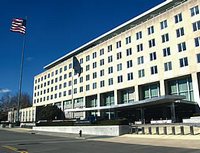Not long after the so-called "civilian surge" was announced as part of the troop buildup in Afghanistan, a veteran State Department foreign service officer I spoke with posed a simple question: "Where are they going to come from?"
He had recently returned from a year serving on a Provincial Reconstruction Team in Afghanistan and was grappling with the lack of civilian expertise that he said was so desperately needed for the state-building tasks there. "Is the new Secretary of Agriculture going to volunteer staff? The Secretary of the Treasury?" He suspected not.
The diplomat's insights get at a central challenge facing the mission in Afghanistan, and a far larger one for State Department operations around the world. To put it bluntly, there's a dearth of diplomats. State maintains 268 posts overseas, about two-thirds of which are considered "hardship" assignments. Afghanistan would be the most extreme case. To make up for deployment into such adverse circumstances, the biggest incentive State has to offer is more pay. Yet, for a number of reasons, more and more of the hardship positions overseas are going unfilled. And the shortfall is stretching thin the country's first line of foreign relations.

